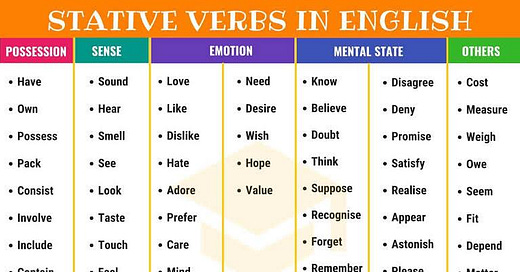A verb is a word that indicates an action in a sentence. Actions could be anything like read, pray, ride, jump, sing, run, etc. What’s important here is that there’s a movement of the parts of the body.A verb gives life to a sentence; and it is an obligatory part of a meaningful sentence.
As long as there is a movement of any part of the body, we will call that action a verb and by extension, a dynamic verb. Say for instance, Olu plays footballs on the field every morning. The implication is that’s Olu cannot possibly be playing football without moving some parts of his body.
A dynamic verb is a verb that indicates an action. A dynamic verb is also known as a main verb, as a lexical verb.
A lexical verb is a verb that attracts regular and irregular formations of tenses in the past tense and past participle, and it conveys full meaning by itself without relying on any verb.
However, not all verbs perform an action. This is our focus today.
A verb may just be used to indicate a state of being—STATIVE VERBS.
States of being exist in possession, mind, sensory perception, emotion, and others.
Stative verbs do not take the –ing form of a verb. That is, they are not used in the continuous/progressive form.I would like you to think of a situation where you have a headache. The headache, in this case, is your state of being; that is your current state, right? That’s what I’m talking about. That’s the nature of stative verbs. You’re most correctly going to say I have a headache. The verb “have”, then, being the stative verb.
Look at this example:
I believe you ✅ as opposed to I’m believing you ❌. This is because when you believe a person in this case, you simply believe. We wouldn’t seem to understand how your “believe” can undergo a process/progressive.
I remember your name ✅. This comes upon you at a go—instantaneously. More like it happens quite fast.
To avoid pitfalls when using stative verbs, you can use a to-infinitive verb as in I’m trying to understand what you just said.
In the same vein, you can also conjugate stative verbs with any of the modals we have in English. For example,
I can hear you. ✅
I’m hearing you. ❌
He would deny you. ✅
He’s denying you. ❌
However, a situation where we have some certain verbs being used as stative verbs and dynamic verbs, they mean slightly different things. Please check Stative verbs II for this full situation.
Write to you some other time. Ciao 👋
With love and everything English,
Francis





👏👏